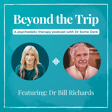
Sean O'Carroll: Bad Trip Integration
In this episode I talk with Sean O'Carroll about the very important topic of bad trips. We get into some detail about what this actually means, we talk about Sean's journey into the psychedelic space and what defines a trip as bad versus challenging. We discuss the importance of seeking support for psychedelic experiences that have been traumatic, and explore the barriers to doing that. We discuss what therapists might do if someone comes to them for support after a bad trip and outline the importance of integration support.
Sean O'Carroll is head of psychotherapy at one of Australia's first purpose-built psychedelic-assisted psychotherapy clinics. He is a lead trainer and therapist at the Monash University Psychedelic Lab in Melbourne, Australia. He does consulting work, including training and supervision for a number of other psychedelic assisted psychotherapy trials. Sean has been studying and exploring human consciousness for over 25 years. His BA honours in philosophy explored the relationship between science, subjectivity and the sacred. He trained as a gestalt Psychotherapist back in 2014 and has worked as a Psychotherapist and an academic lecturing in Transpersonal Psychotherapy, Psychotherapy, Eco-Psychotherapy and other but modalities for the last 10 years.
He is the founder and director of the Wild Mind Institute, which delivers training in psychotherapy, eco psychotherapy, bad trip integration and psychedelic assisted psychotherapy. He's also writing a book about bad trips. Once that's available, we'll put a link in the show notes.
keep in touch with me at Insta: dresmedark
Linkedin: www.linkedin.com/in/dr-esme-dark-627156a0/
website: https://www.esmedarkpsychology.com.au/
Find Monash Clinical Psychedelic Lab at www.monash.edu/psychedelics
Find Sean at - www.wild-mind.com
link to Bad Trip work: https://www.wild-mind.com/stibti
Link to Bad Trip Integration Training: https://www.wild-mind.com/bad-trip-integration
Disclaimer: This podcast if for general information only and does not constitute an endorsement or recommendation for psychedelic- assisted psychotherapy.
















